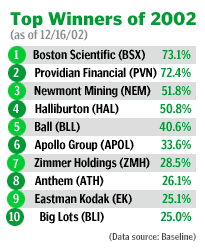NEW YORK (CNN/Money) -
If you invested heavily in the energy sector this year, you'd probably like to forget 2002: seven of the year's ten biggest losers were energy stocks that collapsed in the wake of the Enron debacle.
On the other side of the ledger, the biggest winners for 2002 came from a variety of industries -- an indication that this really has been a stock picker's market.
"We've gone from feast to famine in this market. We began the year on a defensive tone (and moved to) a reversion back to tech and telecom," said Bryan Piskorowski, market analyst at Prudential Securities.
The year's biggest winners in percentage terms come from the medical, financial, education, food and beverage and insurance sectors, to name a few. Meanwhile, all but three of the ten worst performers came from the energy sector.
Graphics chipmaker nVidia fell prey to weak personal computer demand, while electronic manufacturer Sanmina-SCI also suffered from a decline in tech spending, in addition to merger issues and concerns over its balance sheet.
Wireless service provider Sprint PCS struggled with investment losses, stiff competition and an overall drop in demand for telecom technology.

The other biggest losers -- Dynegy, Williams Cos. , Mirant, El Paso, AES, Allegheny Energy, and Calpine -- all fall under the energy umbrella.
Losses in the group were severe: Dynegy, the biggest decliner, tumbled 95.9 percent as of Friday's close, while Allegheny Energy had the smallest loss in the group, falling "only" 77.1 percent.
"I think people misjudged the level of demand for electricity badly and, therefore, they radically overbuilt on hope for increased demand that never materialized," said Paul Freemont, utility analyst at Jefferies & Co.
In addition, most of the seven, with the exception of Allegheny, came under investigation by regulators for alleged improper energy trades or accounting. That caused many investors to flee, especially after the meltdown of Enron just months earlier.
Houston-based Dynegy lost nearly all of its value in 2002 after the Security and Exchange Commission announced a probe into the company's trading activities, which the energy company eventually settled for $3 million. But the settlement didn't prevent the stock from sinking, or save the job of former Chairman and CEO Charles Watson, who resigned.
The company suspended energy trading on its Dynegydirect online systems, cut jobs, sold off units and lowered its financial outlook as a result of the investigation. Shares of Dynegy now trade around $1.
Williams and AES also came out on the losing end of a federal investigation that found the energy traders had conspired to drive up electricity prices during the California energy crisis in April 2000. Tulsa, Okla.-based Williams, now trading just around $3 a share, lost 88.9 percent of its value in 2002 as of Friday's close, while AES tumbled 80.1 percent, and now trades at around $3.50.
"The government made it easy for company management, lawyers and accountants to aggressively interpret what was reasonable or what was not reasonable, therefore causing these companies to take on additional risk that they might not have otherwise," Jefferies & Co.'s Freemont said. "The rules of the road remain very much up in the air."
Best performers cross sectors
Turning the tables, the top 10 performing stocks of 2002 span a number of industries -- evidence of the year's volatile market.
"In the first half, defensive stocks like tobacco, managed care and personal products were at the forefront," Prudential's Piskorowski said. "Now it's more aggressive, riskier growth-type names. It's been an interesting year."
None of the top 10 performing stocks, thus far in 2002, are competitors.

Medical device maker Boston Scientific, up more than 70 percent, led the pack. The Natick, Mass.-based company benefited from strong sales and a court ruling that prevented a rival, Guidant, from bringing its drug-coated stents, being tested for treating heart conditions, to market for another two years. Boston Scientific is trading at about $41.
Credit card lender Providian reported a first-quarter profit when a loss was expected by analysts, starting the year off on an upswing. The San Francisco-based company also said it would cut 2,600 jobs, or 26 percent of its work force, by the end of the year to help significantly lower its overall cost structure for 2002 -- aiding the stock's 72 percent rise.
Shares of Phoenix-based Apollo Group, which provides higher education through its schools including the University of Phoenix, are up about 34 percent so far in 2002. The post-secondary education provider was one of few companies that benefited from a slowing economy, as lost jobs and the need to update employable skills drove people to education.
Meanwhile, Big Lots brought up the rear, rising about 25 percent to trade near $13 a share. The Columbus, Ohio-based closeout retailer, formerly Consolidate Stores, benefited from consumers who were looking for a deal on items from stores that went out of business. The chain also cut costs in an effort to save money.
Oil services provider Halliburton, food and beverage packager Ball, health insurance provider Anthem, gold miner Newmont Mining, photography company Eastman Kodak and orthopedic implant maker Zimmer Holdings were the year's other top winners.

|

